8 books about Evangelistic work
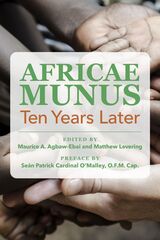
Africae Munus
Ten Years Later
Agbaw-ebai
St. Augustine's Press, 2022
With great foresight and vision for the Church, Pope Emeritus Benedict XVI carefully integrated theological, catechetical and pastoral themes in the Post-Synodal Apostolic Exhortation, Africae Munus. Maurice A. Agbaw-Ebai and Matthew Levering, in the introduction to this collection of reflections and studies focused on the Pope Emeritus’ themes, affirm the African continent’s status as a global center for the growth of the Catholic Church in the twenty-first century and the future of the international Catholic community.
Building on the vitality and enthusiasm of the Church in Africa, it is important to lift their faith through scholarly research and academic reflections. We cannot fully appreciate the dedication, commitment and perseverance of the Catholic community throughout the African continent if we do not know the truth of their sufferings and persecution and understand their resilience in the light of faith. This collection, drawn from the halls of academia, provides an important contribution to the understanding and advancement of Catholic Africa, following the insights and enlightenment of Pope Emeritus Benedict. It is my hope that these essays will enrich your understanding and experience of the Catholic faith.
— From the Preface by Seán Patrick Cardinal O’Malley
Building on the vitality and enthusiasm of the Church in Africa, it is important to lift their faith through scholarly research and academic reflections. We cannot fully appreciate the dedication, commitment and perseverance of the Catholic community throughout the African continent if we do not know the truth of their sufferings and persecution and understand their resilience in the light of faith. This collection, drawn from the halls of academia, provides an important contribution to the understanding and advancement of Catholic Africa, following the insights and enlightenment of Pope Emeritus Benedict. It is my hope that these essays will enrich your understanding and experience of the Catholic faith.
— From the Preface by Seán Patrick Cardinal O’Malley
[more]
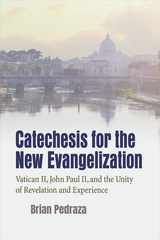
Catechesis for the New Evangelization
Vatican II, John Paul II, and the Unity of Revelation and Experience
Brian Pedraza
Catholic University of America Press, 2020
Popes Francis, Benedict XVI, and John Paul II have called the present a time of New Evangelization for the Church and have stressed the importance of catechesis for this mission. John Paul II claimed that this renewal of the Church’s mission is grounded in the teachings of the Second Vatican Council. Nevertheless, approaches to catechesis in the conciliar and postconciliar era have varied greatly, as evidenced by the shifts in catechetical practice effected by the modern catechetical movement. Just as the dominant forms of theology changed from neo-scholastic to anthropological approaches so, too, did catechesis move from catechism-based approaches to more anthropological models based upon human experience.
In light of this context, Catechesis for the New Evangelization examines the theological foundations of catechesis in the Church’s understanding of divine revelation and its reception by the human person, especially as found in the conciliar constitutions, Dei Verbum and Gaudium et Spes. After drawing norms on divine revelation from these documents, it traces the history of the modern catechetical movement in order to compare this history with the conciliar norms, highlighting the renewal’s strengths and weaknesses.
These steps prepare the way for the main part of the book: an examination of the anthropology of Karol Wojtyła/Pope John Paul II. Ultimately, his anthropology provides an understanding of the person that can unite divine revelation and human experience in a way that takes what is best from the modern catechetical movement, while developing the ministry in a way that can be fruitful for the New Evangelization.
Pedraza’s book is not only an incisive look at modern catechetical history and theory. It also touches upon some of the most important theological topics of the past century, including the neo-scholastic crisis, the proper interpretation of the Council, the relationship of nature and grace, and the modern understanding of the imago dei, with the research and competency appropriate for scholarly interest and the accessibility needed for educated practitioners in catechesis.
[more]
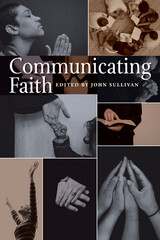
Communicating Faith
John Sullivan
Catholic University of America Press, 2011
This book enriches appreciation of the many ways that Christian faith is communicated. It casts light on the sensitivities, skills, and qualities necessary for the effective communication of faith, where justice is done both to the "seed" to be sown and to the "soil" being cultivated.
[more]
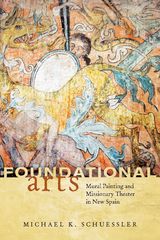
Foundational Arts
Mural Painting and Missionary Theater in New Spain
Michael K. Schuessler
University of Arizona Press, 2013
The languages of two hemispheres collided when Spain conquered Mexico, and as a result, a dynamic expression of visual and dramatic arts emerged. Mural painting and missionary theater quickly became the media to explain and comprehend the encounter of indigenous peoples with Christ and the crucifixion, as well as with heaven and hell.
In Foundational Arts Michael K. Schuessler asserts that the literature of New Spain begins with missionary theater and its intimate relationship to mural painting. In particular, he examines the relationships between texts and visual images that emerged in Mexico at two Augustinian monasteries in Hidalgo, Mexico, during the century following the Spanish Conquest. The forced combination of the ideographical tradition of Nahuatl with Latin-based language alphabets led to a fascinating array of new cultural expressions.
Missionary theater was organized by ingenious friars with the intent to convert and catechize indigenous populations. Often performed in Nahuatl or other local languages, the actors combined Latin-based language texts with visual contexts that corresponded to indigenous ways of knowing: murals, architectural ornamentation, statuary, altars, and other modes of visual representation. By concentrating on the interrelationship between mural painting and missionary theater, Foundational Arts explores the artistic and ideological origins of Mexican plastic arts and literature.
In Foundational Arts Michael K. Schuessler asserts that the literature of New Spain begins with missionary theater and its intimate relationship to mural painting. In particular, he examines the relationships between texts and visual images that emerged in Mexico at two Augustinian monasteries in Hidalgo, Mexico, during the century following the Spanish Conquest. The forced combination of the ideographical tradition of Nahuatl with Latin-based language alphabets led to a fascinating array of new cultural expressions.
Missionary theater was organized by ingenious friars with the intent to convert and catechize indigenous populations. Often performed in Nahuatl or other local languages, the actors combined Latin-based language texts with visual contexts that corresponded to indigenous ways of knowing: murals, architectural ornamentation, statuary, altars, and other modes of visual representation. By concentrating on the interrelationship between mural painting and missionary theater, Foundational Arts explores the artistic and ideological origins of Mexican plastic arts and literature.
[more]
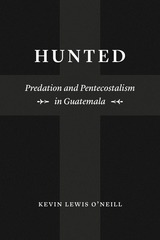
Hunted
Predation and Pentecostalism in Guatemala
Kevin Lewis O'Neill
University of Chicago Press, 2019
“It’s not a process,” one pastor insisted, “rehabilitation is a miracle.” In the face of addiction and few state resources, Pentecostal pastors in Guatemala City are fighting what they understand to be a major crisis. Yet the treatment centers they operate produce this miracle of rehabilitation through extraordinary means: captivity. These men of faith snatch drug users off the streets, often at the request of family members, and then lock them up inside their centers for months, sometimes years.
Hunted is based on more than ten years of fieldwork among these centers and the drug users that populate them. Over time, as Kevin Lewis O’Neill engaged both those in treatment and those who surveilled them, he grew increasingly concerned that he, too, had become a hunter, albeit one snatching up information. This thoughtful, intense book will reframe the arc of redemption we so often associate with drug rehabilitation, painting instead a seemingly endless cycle of hunt, capture, and release.
Hunted is based on more than ten years of fieldwork among these centers and the drug users that populate them. Over time, as Kevin Lewis O’Neill engaged both those in treatment and those who surveilled them, he grew increasingly concerned that he, too, had become a hunter, albeit one snatching up information. This thoughtful, intense book will reframe the arc of redemption we so often associate with drug rehabilitation, painting instead a seemingly endless cycle of hunt, capture, and release.
[more]
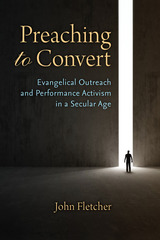
Preaching to Convert
Evangelical Outreach and Performance Activism in a Secular Age
John Fletcher
University of Michigan Press, 2015
Preaching to Convert offers an intriguing new perspective on the outreach strategies of U.S. evangelicals, framing them as examples of activist performance, broadly defined as acts performed before an audience in the hopes of changing hearts and minds. Most writing about activist performance has focused on left-progressive causes, events, and actors. Preaching to Convert argues against such a constricted view of activism and for a more nuanced understanding of U.S. evangelicalism as a movement defined by its desire to win converts and spread the gospel.
The book positions evangelicals as a diverse, complicated group confronting the loss of conservative Christianity’s default status in 21st-century U.S. culture. In the face of an increasingly secular age, evangelicals have been reassessing models of outreach. In acts like handing out Bible tracts to strangers on the street or going door-to-door with a Bible in hand, in elaborately staged horror-themed morality plays or multimillion-dollar creationist discovery centers, in megachurch services beamed to dozens of satellite campuses, and in controversial “ex-gay” ministries striving to return gays and lesbians to the straight and narrow, evangelicals are redefining what it means to be deeply committed in a pluralist world. The book’s engaging style and careful argumentation make it accessible and appealing to scholars and students across a range of fields.
The book positions evangelicals as a diverse, complicated group confronting the loss of conservative Christianity’s default status in 21st-century U.S. culture. In the face of an increasingly secular age, evangelicals have been reassessing models of outreach. In acts like handing out Bible tracts to strangers on the street or going door-to-door with a Bible in hand, in elaborately staged horror-themed morality plays or multimillion-dollar creationist discovery centers, in megachurch services beamed to dozens of satellite campuses, and in controversial “ex-gay” ministries striving to return gays and lesbians to the straight and narrow, evangelicals are redefining what it means to be deeply committed in a pluralist world. The book’s engaging style and careful argumentation make it accessible and appealing to scholars and students across a range of fields.
[more]
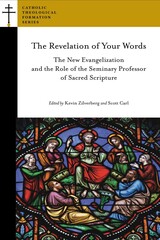
The Revelation of Your Words
The New Evangelization and the Role of the Seminary Professor of Sacred Scripture
Kevin Zilverberg
Saint Paul Seminary Press, 2021
The Revelation of Your Words, a collection of essays, treats the role of the seminary professor of sacred Scripture within the context of the New Evangelization. Some of the essays concern principally the imparting of knowledge and best practices to accomplish this; others concern the fostering of delight in the sacred page and spiritual encounter with God. Although these essays are Catholic, written within a Catholic theological framework and with Catholic seminaries in mind, many of their conclusions can be applied to non-Catholic environments. This book provides insights that, even beyond the seminary, will benefit teachers of the Bible, regardless of their denomination and level of instruction.
Readers will encounter the following authors and topics. Peter S. Williamson writes on the implications of the New Evangelization for priestly ministry and for teaching Scripture. Steven C. Smith makes a contribution concerning the role of the seminary professor of sacred Scripture in forming priests. Michael Magee treats the relevance of Johannine irony to the New Evangelization. Stephen Ryan’s chapter takes up the topic of Old Testament Wisdom literature and formation for a New Evangelization. Juana L. Manzo seeks a path to integrate modern and ancient interpretations into the seminary classroom. Kelly Anderson takes up the father of Proverbs 1–9 as a model of spiritual fatherhood for seminary professors. Scott Carl proposes a spiritual reading of sacred Scripture in the twenty-first century. Michael Magee, in his second contribution, writes on the joy of discovery in the Fourth Gospel. James Keating reflects upon the exegete as seminary formator. Finally, André Villeneuve advocates for the teaching of Biblical Hebrew in Catholic seminaries and academic institutions.
[more]
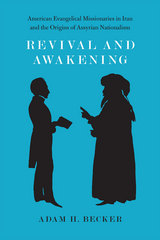
Revival and Awakening
American Evangelical Missionaries in Iran and the Origins of Assyrian Nationalism
Adam H. Becker
University of Chicago Press, 2015
Most Americans have little understanding of the relationship between religion and nationalism in the Middle East. They assume that the two are rooted fundamentally in regional history, not in the history of contact with the broader world. However, as Adam H. Becker shows in this book, Americans—through their missionaries—had a strong hand in the development of a national and modern religious identity among one of the Middle East's most intriguing (and little-known) groups: the modern Assyrians. Detailing the history of the Assyrian Christian minority and the powerful influence American missionaries had on them, he unveils the underlying connection between modern global contact and the retrieval of an ancient identity.
American evangelicals arrived in Iran in the 1830s. Becker examines how these missionaries, working with the “Nestorian” Church of the East—an Aramaic-speaking Christian community in the borderlands between Qajar Iran and the Ottoman Empire—catalyzed, over the span of sixty years, a new national identity. Instructed at missionary schools in both Protestant piety and Western science, this indigenous group eventually used its newfound scriptural and archaeological knowledge to link itself to the history of the ancient Assyrians, which in time led to demands for national autonomy. Exploring the unintended results of this American attempt to reform the Orient, Becker paints a larger picture of religion, nationalism, and ethnic identity in the modern era.
American evangelicals arrived in Iran in the 1830s. Becker examines how these missionaries, working with the “Nestorian” Church of the East—an Aramaic-speaking Christian community in the borderlands between Qajar Iran and the Ottoman Empire—catalyzed, over the span of sixty years, a new national identity. Instructed at missionary schools in both Protestant piety and Western science, this indigenous group eventually used its newfound scriptural and archaeological knowledge to link itself to the history of the ancient Assyrians, which in time led to demands for national autonomy. Exploring the unintended results of this American attempt to reform the Orient, Becker paints a larger picture of religion, nationalism, and ethnic identity in the modern era.
[more]
READERS
Browse our collection.
PUBLISHERS
See BiblioVault's publisher services.
STUDENT SERVICES
Files for college accessibility offices.
UChicago Accessibility Resources
home | accessibility | search | about | contact us
BiblioVault ® 2001 - 2024
The University of Chicago Press









